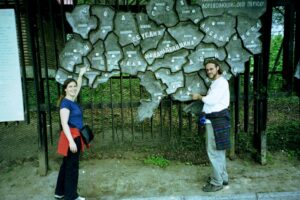Keya Rohovit-Wrolson Found Strength Through Her Journey
Keya Rohovit-Wrolson joined the U.S. Peace Corps in 2003 with plans to serve in Ukraine for two years. She has a spirit of community and giving back and so it was only natural it would lead her to the Peace Corps.

Her service brought her both love and an uncertain future. It was there that she met the man who is now her husband. During that time Keya also began experiencing odd symptoms and her health started to deteriorate.
A few months into her service, Keya noticed strange red spots appearing on her arms and hips. Over time, other symptoms followed—joint pain, muscle weakness, and significant weight loss. Despite efforts from a nurse and a local Ukrainian doctor, the cause remained a mystery.
“Diagnostic equipment was sparse and access to it was limited,” she recalled.
Being an American and a federal employee helped her bypass some of the barriers, but answers were still elusive. During that time, Keya stayed emotionally grounded by immersing herself in the community work.
“Keeping busy is how I manage emotions,” she said.
Keya’s budding romance with Tracy also provided an emotional anchor. Their conversations about marriage and shared adventures ahead helped shift her focus.
“It was an exciting distraction from any worries about my mysterious, declining health,” she explained.
Worsening Symptoms
When her symptoms worsened, Keya was sent to Washington, DC, where the search for answers intensified. Her condition rapidly deteriorated.
“The spot on my left hip had spread across my hip from my waist almost to my knee and was becoming painful,” she said. She also had difficulty breathing and the intense joint pain brought prevented her from sleeping. She relied on her sister, who lived nearby, staying at her home and spending time with her nephew, a toddler, brought meaningful moments of joy amid the chaos.
Over the course of two weeks, Keya saw 12 specialists. One internal medicine doctor took a personal interest, seeing her daily during his lunch break. Still, they could not find a conclusive diagnosis until Keya underwent a lung biopsy.
“Tracy left his Peace Corps service at this point and made it to DC just in time for the surgery,” Keya added. It was then that doctors finally pinpointed vasculitis.
The next step was a trip to Ohio, where Keya saw rheumatologist Dr. Gary Hoffman at the Cleveland Clinic. He confirmed her diagnosis of microscopic polyangiitis (MPA). In just four months from the onset of symptoms, Keya had her diagnosis—and with it, the beginning of her treatment.
Initially, she was prescribed Cytoxan, then methotrexate—and gradually tapered off prednisone over several years.
Starting a New Life
In that time, she and Tracy were married. Today they live in Prineville, Oregon, a small town surrounded by natural beauty and a close-knit community.  Professionally, she works in social services for the State of Oregon. Her role as a change leader involves guiding both staff and leadership through transitions, such as updates to data systems or shifts in operational processes.
Professionally, she works in social services for the State of Oregon. Her role as a change leader involves guiding both staff and leadership through transitions, such as updates to data systems or shifts in operational processes.
Beyond her career, Keya, 47, is engaged with her community, sitting on several boards that support local initiatives such as the county library, the LGBTQ+ community, and a summer musical theater camp.
Family plays an important role in Keya’s life. She shares her home with her husband, Tracy, and their two children, Cairo, 16, and Capri, 14. Together, they enjoy traveling the world.
But, as many people with vasculitis can attest, navigating the journey to family was not easy. During Keya’s second pregnancy in 2010, she experienced a relapse. At just six weeks pregnant, she began coughing up blood, prompting urgent medical consultations.
“The first doctors I spoke with believed that a medical termination of the pregnancy might be an important consideration,” she said.
It was a deeply distressing period, made bearable through her husband’s steady support and her ability to stay focused on her work. Relief came when Keya met with a specialist who confirmed that her pregnancy could proceed with the right management.
“My doctors paid close attention with weekly labs, and while I did deliver at 32 weeks, she was a very healthy baby,” she shared. 
Finding Support
Since that time, Keya’s condition has remained largely stable. She has been medication-free for the past eight years, although she occasionally experiences joint pain in her hands. She maintains her health with a combination of routine medical care, support from her rheumatologist, and a self-care regimen guided by a functional medicine practitioner. This includes attention to nutrition, daily vitamins, stretches, breathing exercises, and occasional physical therapy or chiropractic care.
Reflecting on her healthcare journey, Keya notes the contrast between the limited resources she encountered in Ukraine and the accessibility she experienced during her diagnosis in Washington, DC. Since moving to rural Oregon in 2006, she has faced challenges in accessing specialists, at one point traveling three hours for rheumatology care.
“Over the years, local resources have improved, and I now only have to travel about 45 minutes to the next town over,” she said.
Before her diagnosis, Keya had never heard of vasculitis, and she suspects many of her doctors hadn’t either. It was a journey of uncertainty, but she remembers being buoyed by the compassion of medical professionals, Peace Corps staff, and the many friends and family who sent encouraging notes. Though she doesn’t face daily symptoms, her experience taught her to value strong relationships with medical providers.
“I’ve learned to build positive, working relationships with medical providers who are interested,” she said. “I’ve left providers who weren’t very interested or cooperative — even if it meant more travel. For me, that’s been worth it.”
Her greatest source of hope comes from the research and resources that have emerged since her diagnosis. The Vasculitis Foundation has been especially valuable, offering accessible information and community through webinars and stories.
“When I was diagnosed, there weren’t a lot of resources outside of scientific articles that were hard to understand,” Keya said. “I’ve enjoyed receiving information and learning about all the different ways vasculitis can impact people’s lives.”
While she doesn’t live by a specific mantra, Keya holds a perspective grounded in resilience.
“The life experience of being sick with a rare condition, working with a medical team toward diagnosis, and coming to understand my own mortality is one that helps me manage a balanced perspective through other challenges in my life,” she said.
